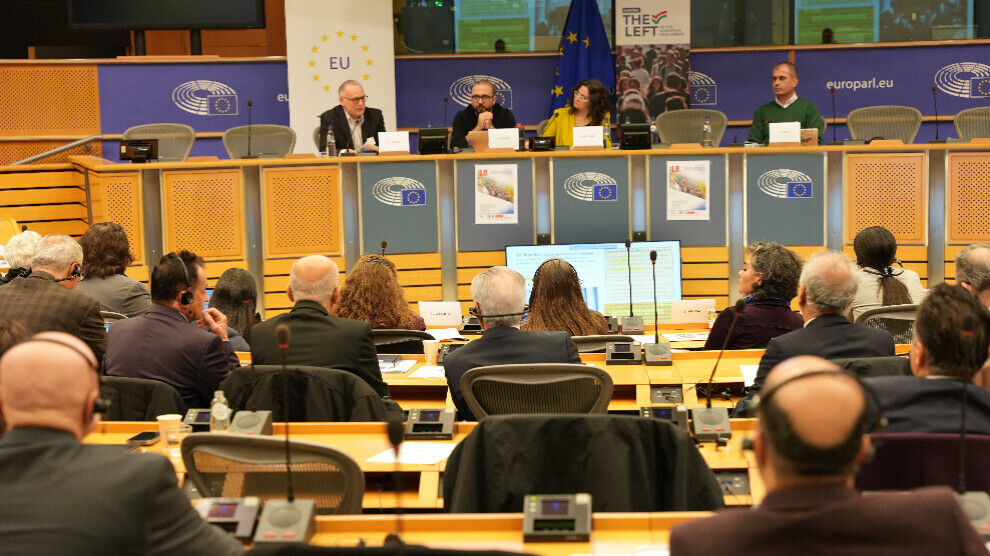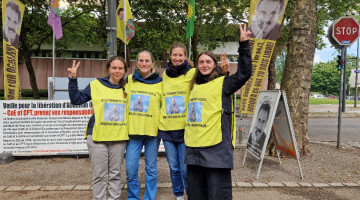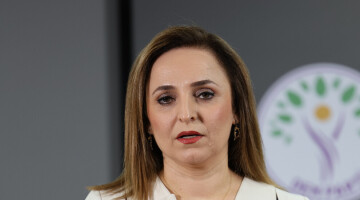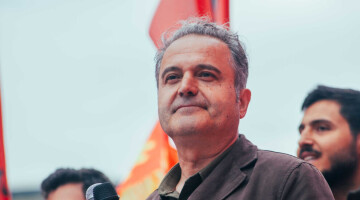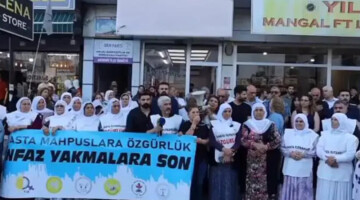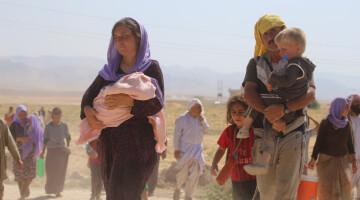The second day sessions of the conference organised by the EU Turkey Civic Commission (EUTCC) under the title "European Union, Turkey, Middle East and Kurds" started at 09.00. On 6 December, in the opening speeches of the session, the call for the freedom of Kurdish People's Leader Abdullah Öcalan and the removal of the PKK from the list of terrorist organisations came to the fore.
KIESER: THE TREATY OF LAUSANNE WAS A DISASTER
The first session of the second day focused on the Treaty of Lausanne and its consequences. In the session chaired by Nil Mutluer from Leipzig University, Hans-Lukas Kieser from Zurich University gave a presentation titled "The Treaty of Lausanne: History and Political Continuities".
While evaluating the results of the Treaty of Lausanne, Kieser used the expression "a complete disaster" and stated that the rights of local communities were thrown away in this process.
Sharing some testimonies on how the Nazis were inspired by the practices of the Turkish state, Kieser noted that the Treaty of Lausanne is at the root of today's problems. Drawing attention to the demographic change policies in Turkey and Kurdistan with a map, Kieser stated that Kurds were "turned into a minority without minority rights". "With the Treaty of Lausanne, the pluralist Anatolian project was thrown away; a unitary, centralised and nationalist profile of Turkey came to the fore," he said. "The Nazis understood this very well," Kieser said, adding that the Nazis were inspired by the results of Lausanne.
YASİN SUNCA: THE KURDISH QUESTION IS AN INTERNATIONAL ISSUE
Jan Yasin Sunca from Bielefeld University stated that the Kurdish question is also an "issue of non-peace" in the region and emphasised that the underlying cause of this problem is "colonialism".
Yasin Sunca said, "The Kurdish question is actually an international issue. The problem of nation-states in the Middle East is linked to the colonisation of Kurdistan". Stating that defining the problem as ethnic nationalism would ignore historical injustice, Yasin Sunca said that this perspective leads to definitions such as "separatism" and "terrorism".
"Any gains for the Kurds are perceived as a threat by the states in the region," Sunca said, noting that states are trying to legitimise their own injustices.
Remarking that Kurds have been subjected to injustice throughout history, Sunca said, "If your resistance is also punished, then every minute is an injustice" and drew attention to the PKK's inclusion in the list of terrorist organisations. Pointing out that the murder of three Kurdish women revolutionaries -Sakine Cansız, Fidan Doğan and Leyla Şaylemez- in Paris in 2013 was also linked to the reduction of the Kurdish question to a security issue, Sunca emphasised that "Kurds are not at war with the West, they are fighting for their own freedom". He also talked about the Kurds' democratic projects and the solutions they have realised.
DİCLE: THERE IS NONSOLUTION IN THE CODES OF THE TURKISH STATE
The last presentation of the first panel was given by journalist Amed Dicle under the title "Europe and the Kurdish Question: Historical Responsibility and Expectations". In his presentation in Kurdish, Amed Dicle, while evaluating the European factor with regard to the Kurds and their search for a solution, drew attention to a century of denial and annihilation against the Kurds.
The Kurdish journalist said, "Today, the Kurds, who have a population of more than 40 million, remain the largest stateless people and have become a political actor as a result of long struggles."
Pointing out that 40 years have passed since the last state of war that started in 1984, Dicle said, "The reality of war has not been accepted either by the state or by governments. However, all institutions and organisations of the state and the social space were designed according to this war."
Dicle emphasised that "there is not a solution, but nonsolution in the codes of the Turkish state".
Talking about the position and gains of the Kurds after the Syrian civil war started in 2011, Dicle said: "The Rojava Convention, namely the Rojava Constitution, which is currently being implemented in Rojava, is unprecedented in the history of the Middle East. It cannot be said that there is a better draft than this, a better contract for the peoples and democracy."
Dicle said, "Kurds support the peace and coexistence project that they want to realise in the Middle East. However, current political calculations and commercial relations stand as an obstacle to this support."
Amed Dicle added: "The solution of the Kurdish question in Turkey will solve not only economic problems but also political problems. In order for the European Union to remain an island of peace, the Kurdish question in Turkey must be resolved. This could also pave the way for a regional peace movement."

